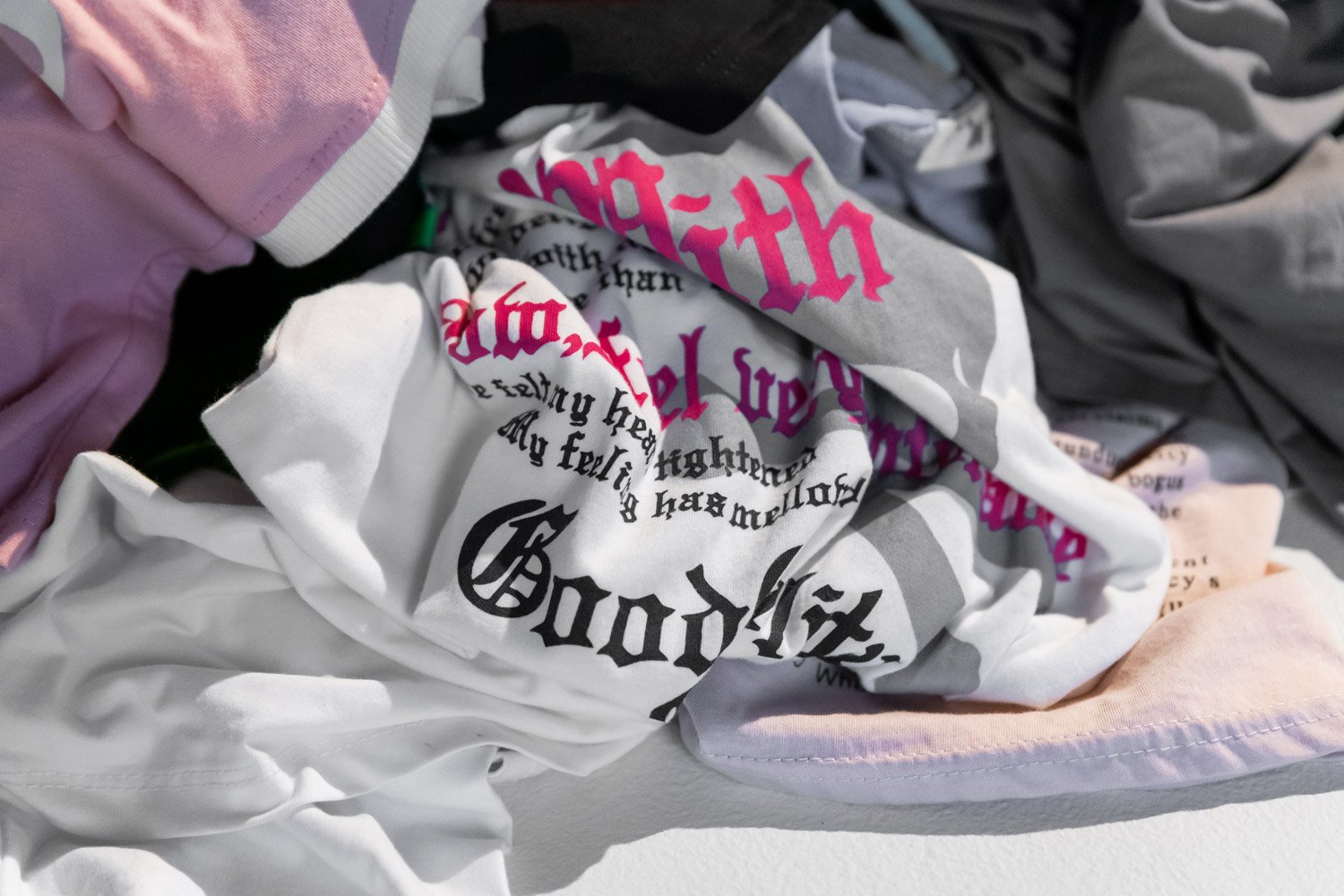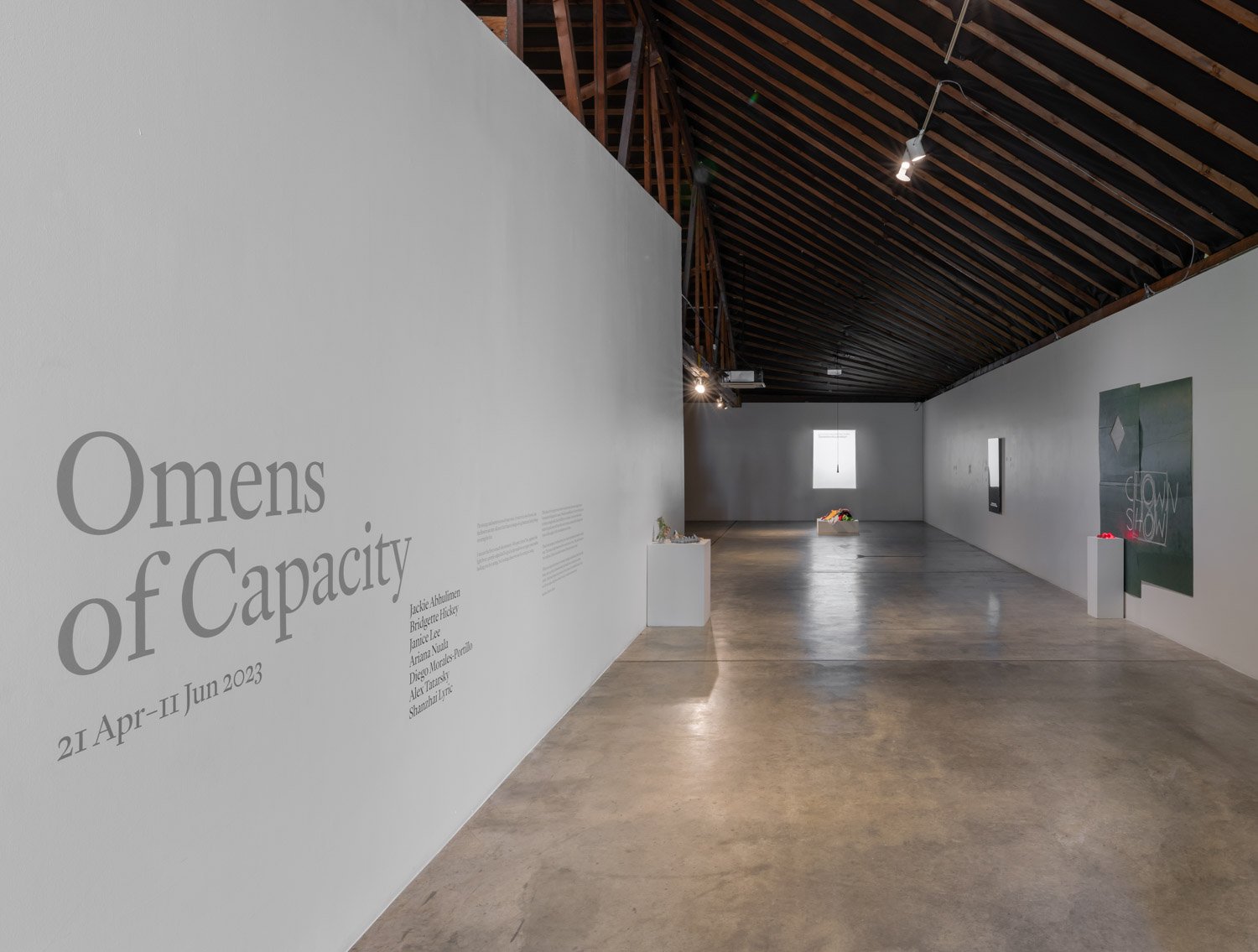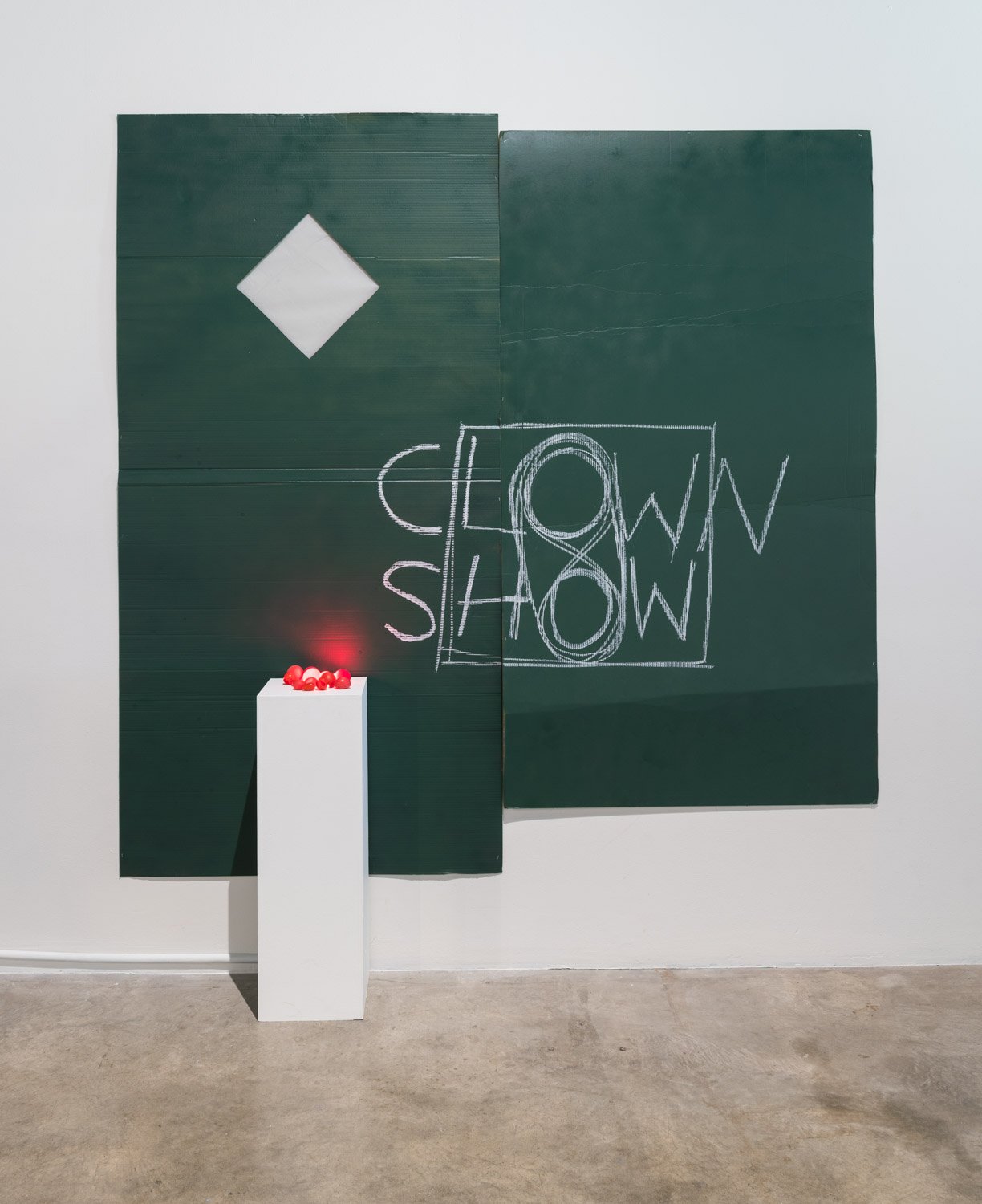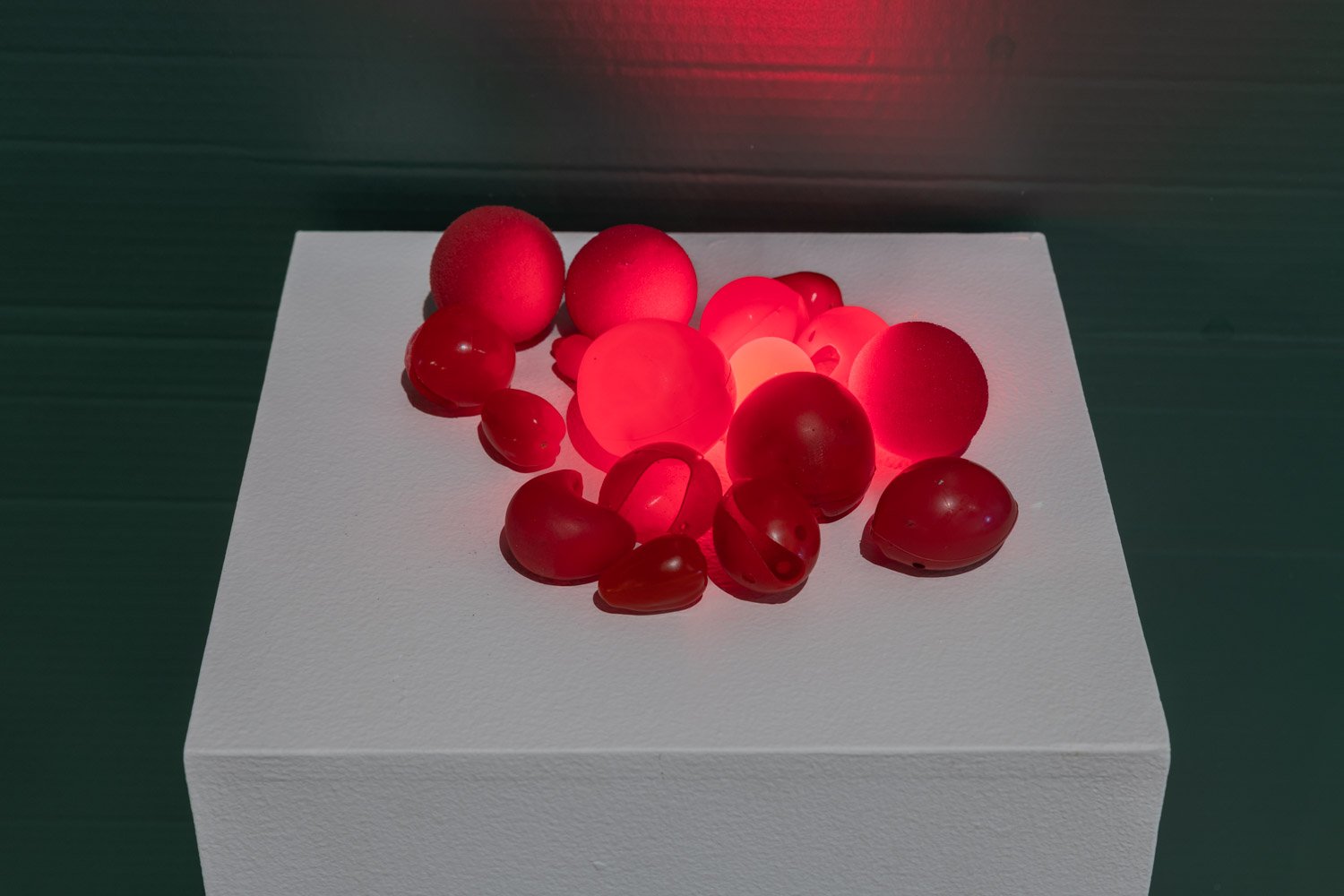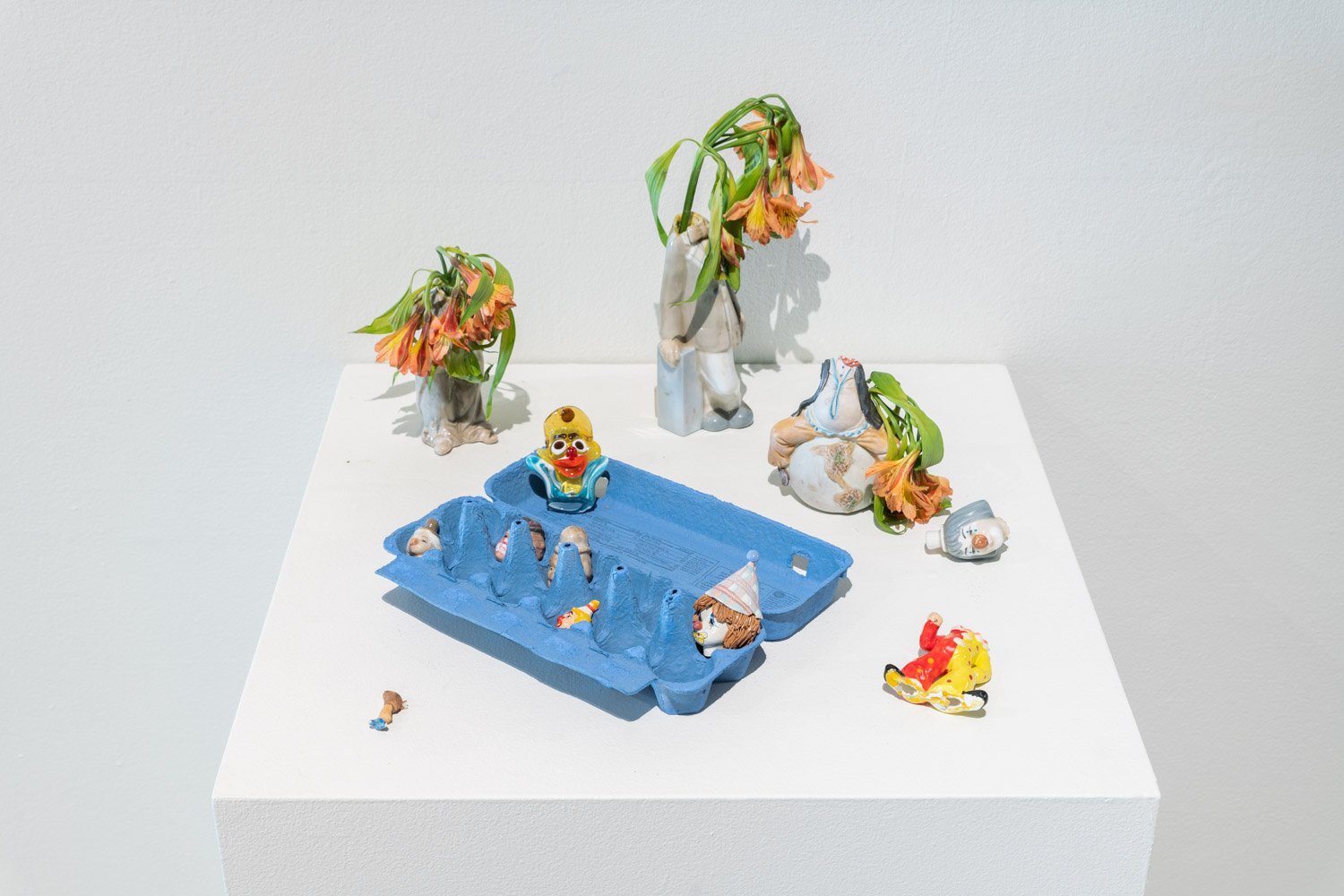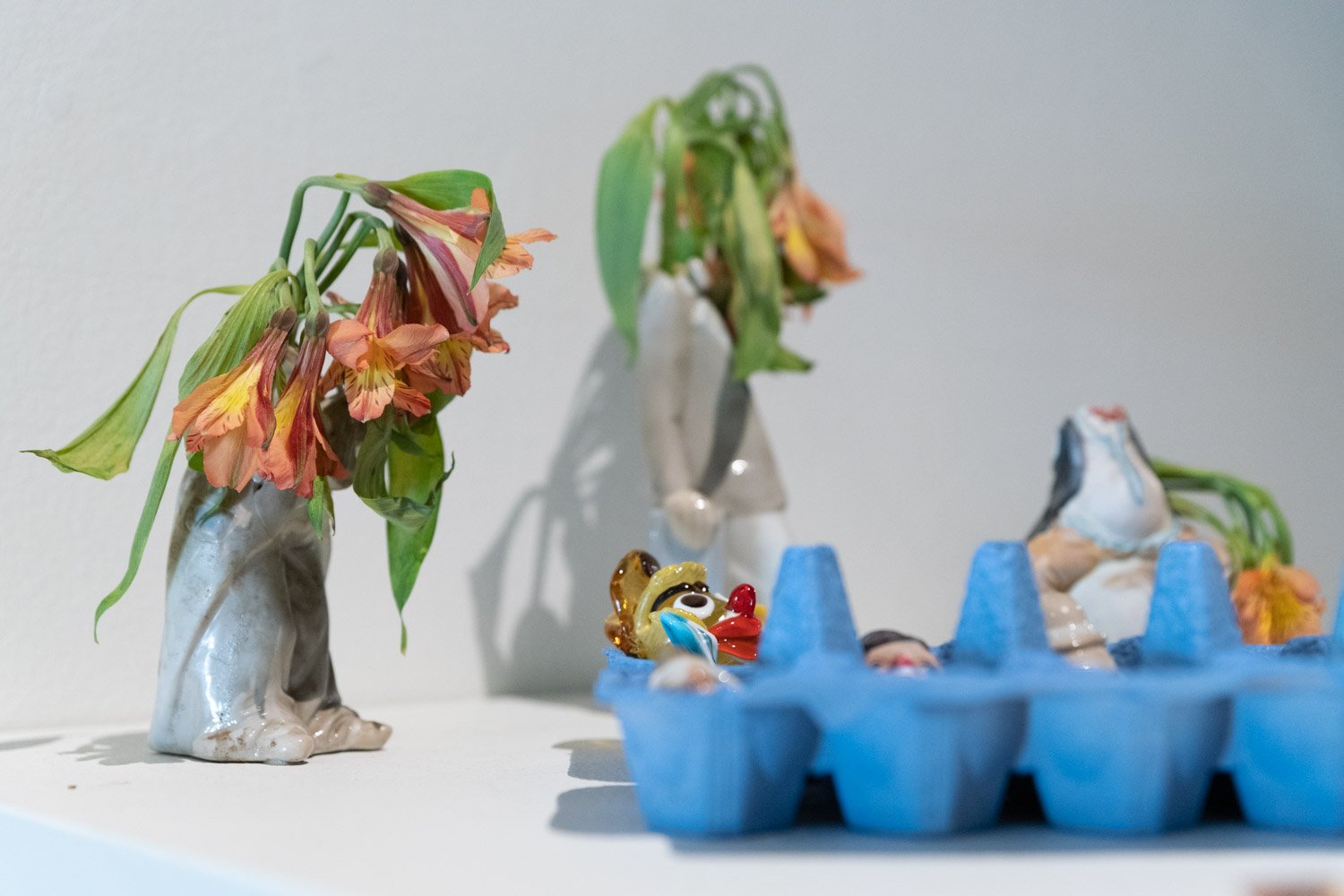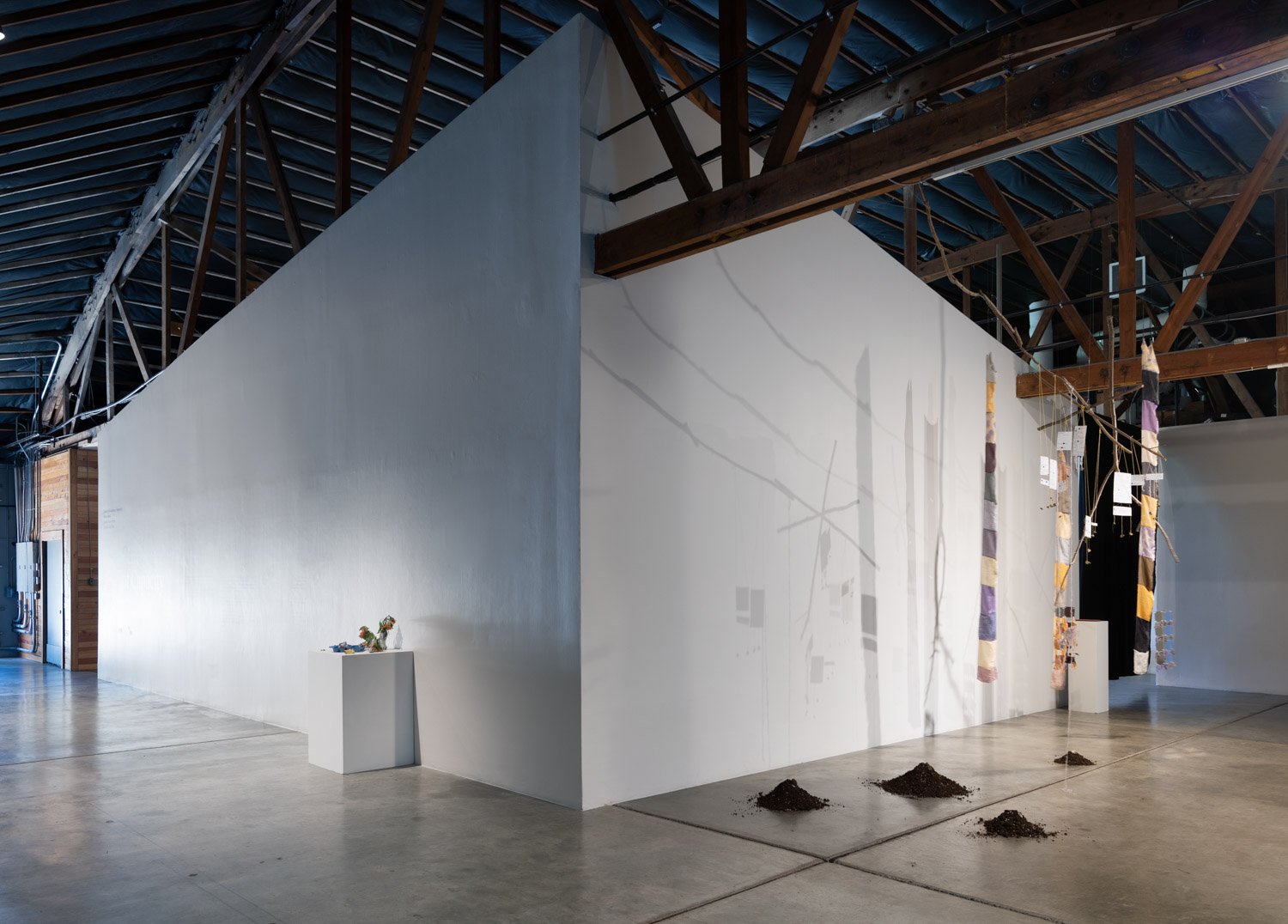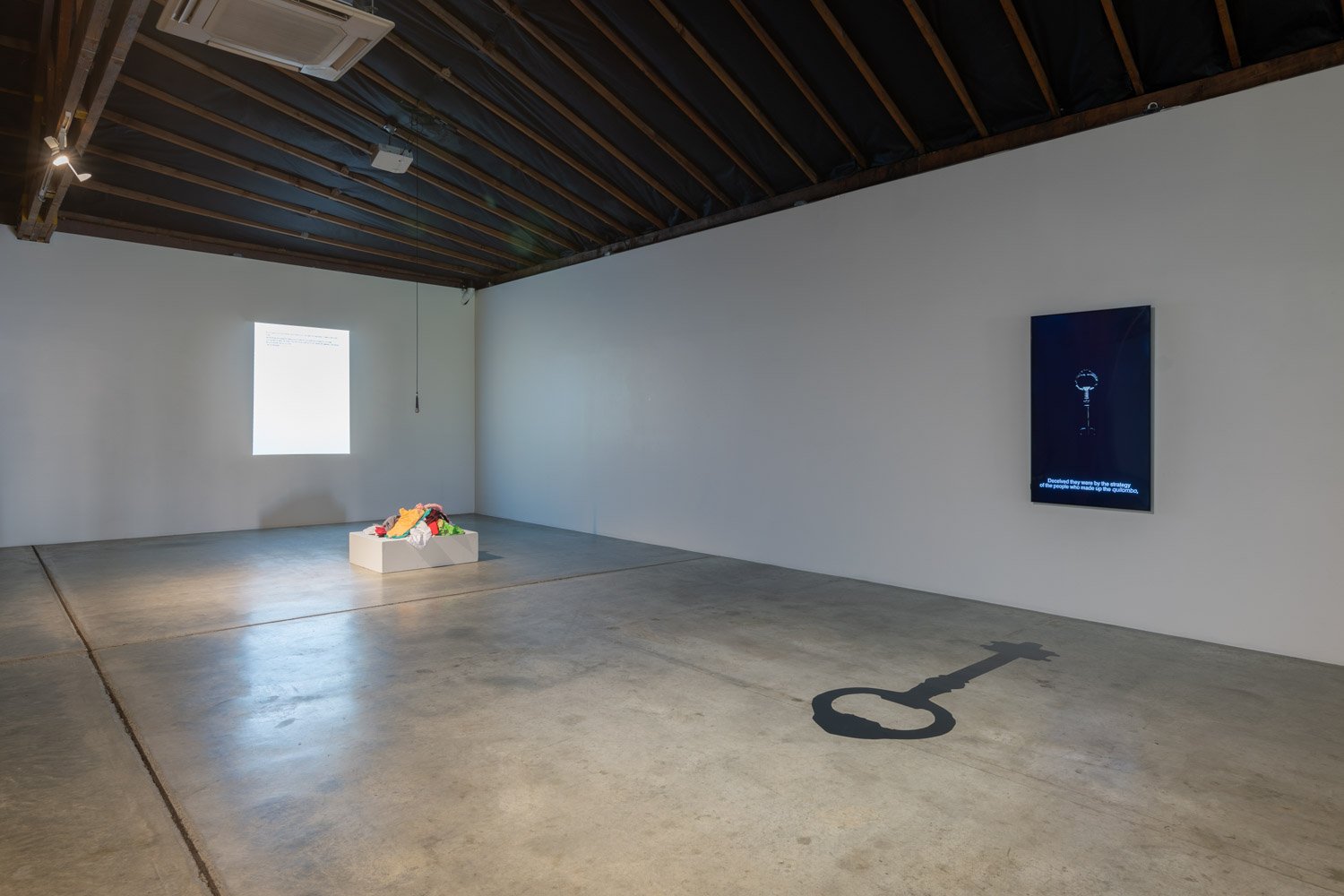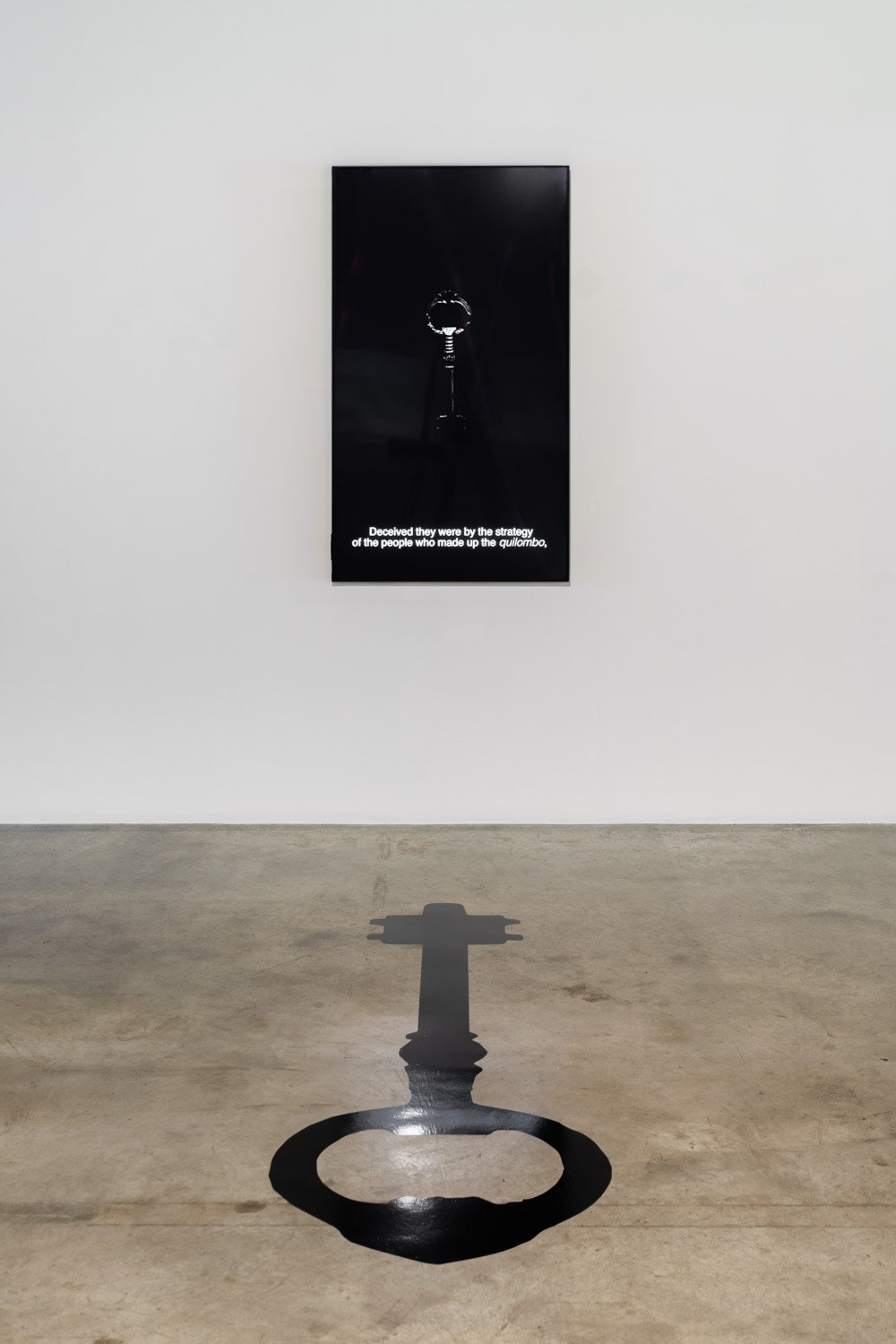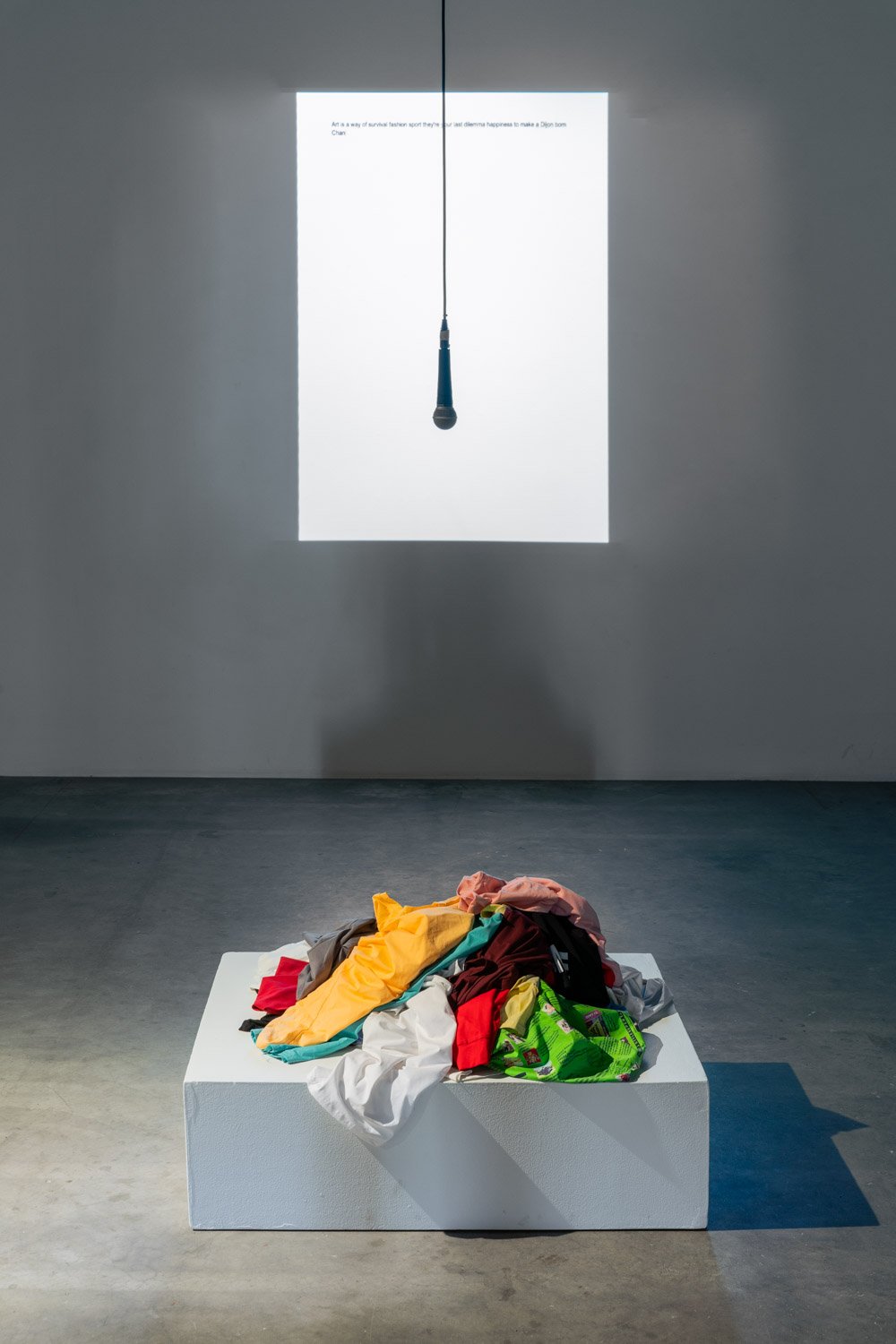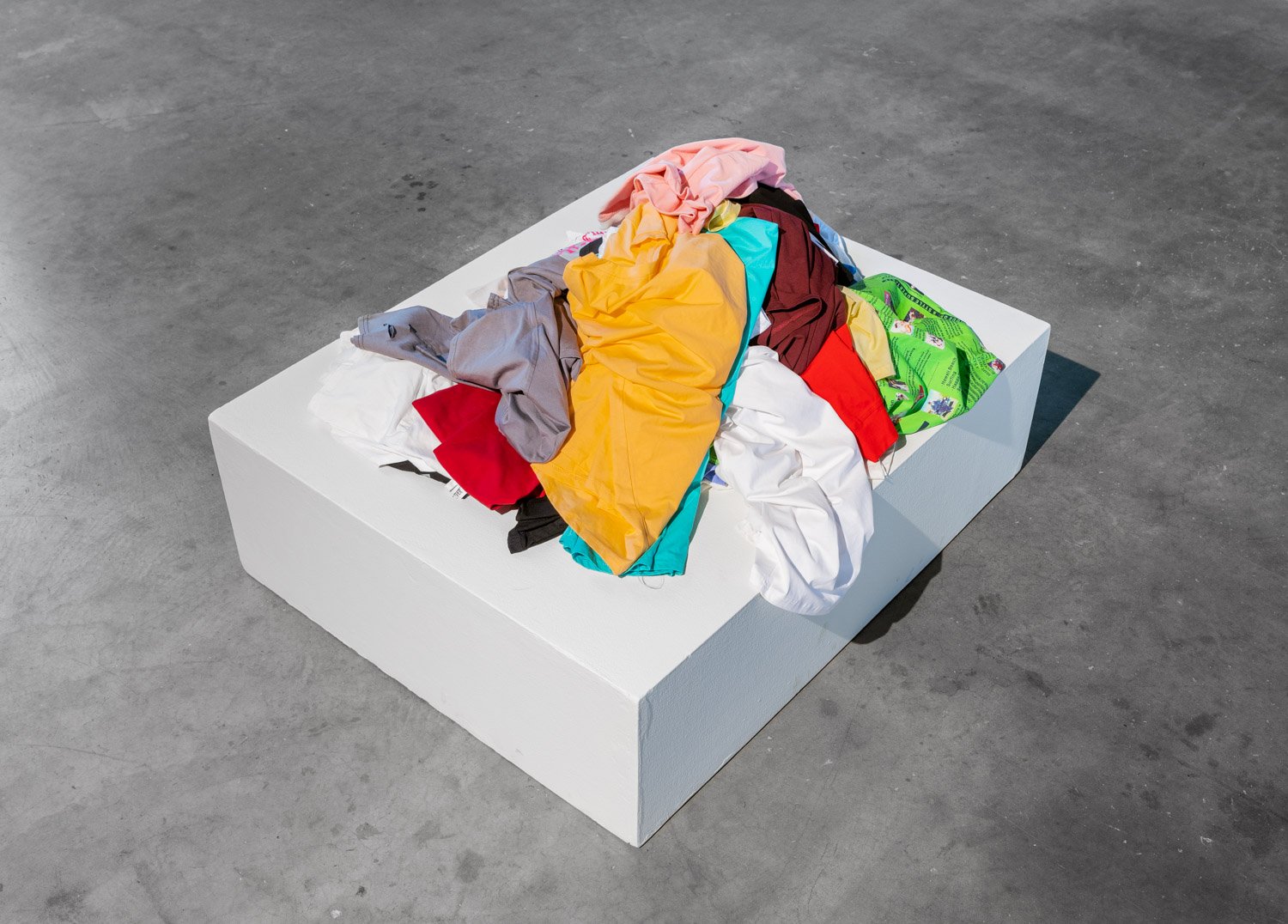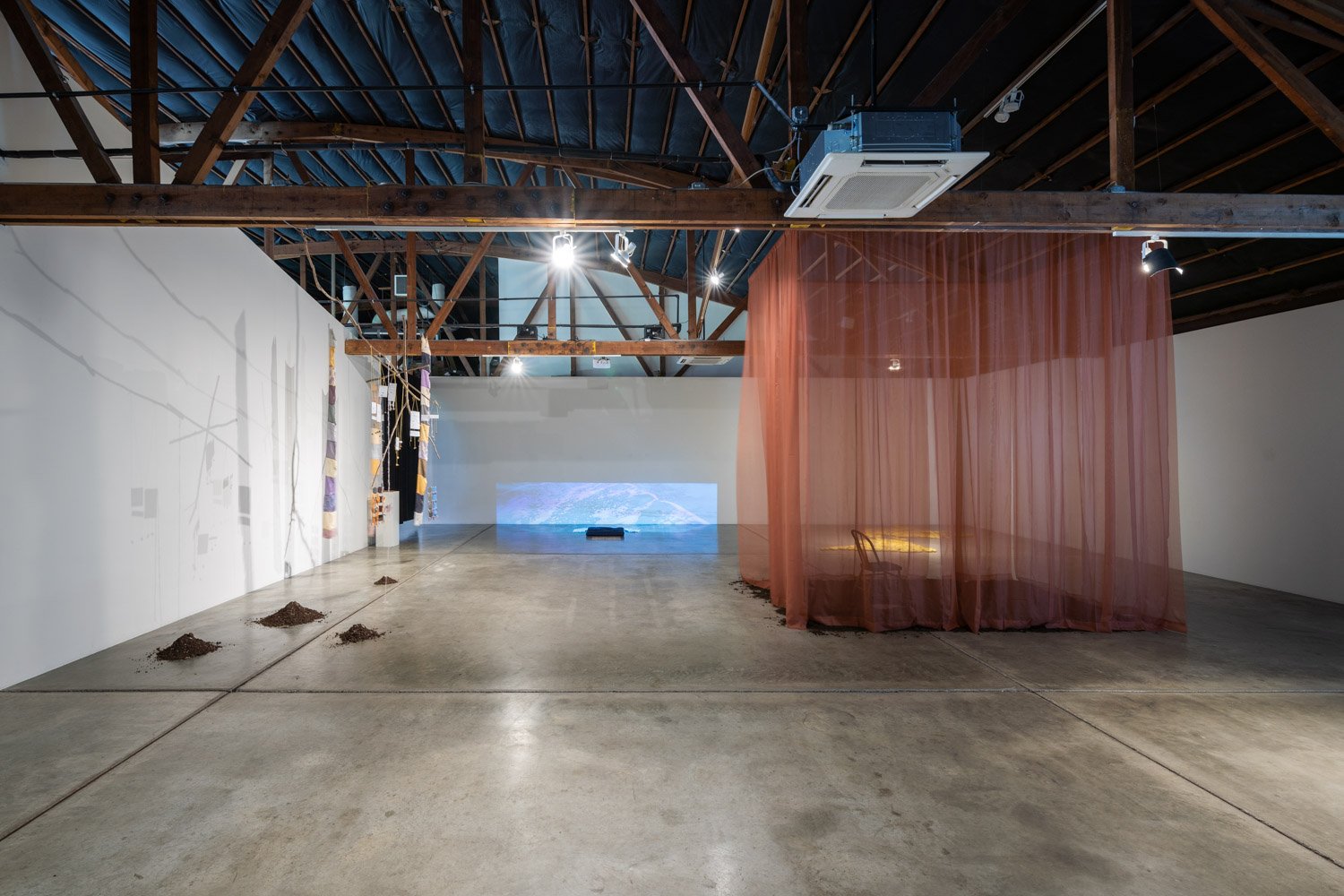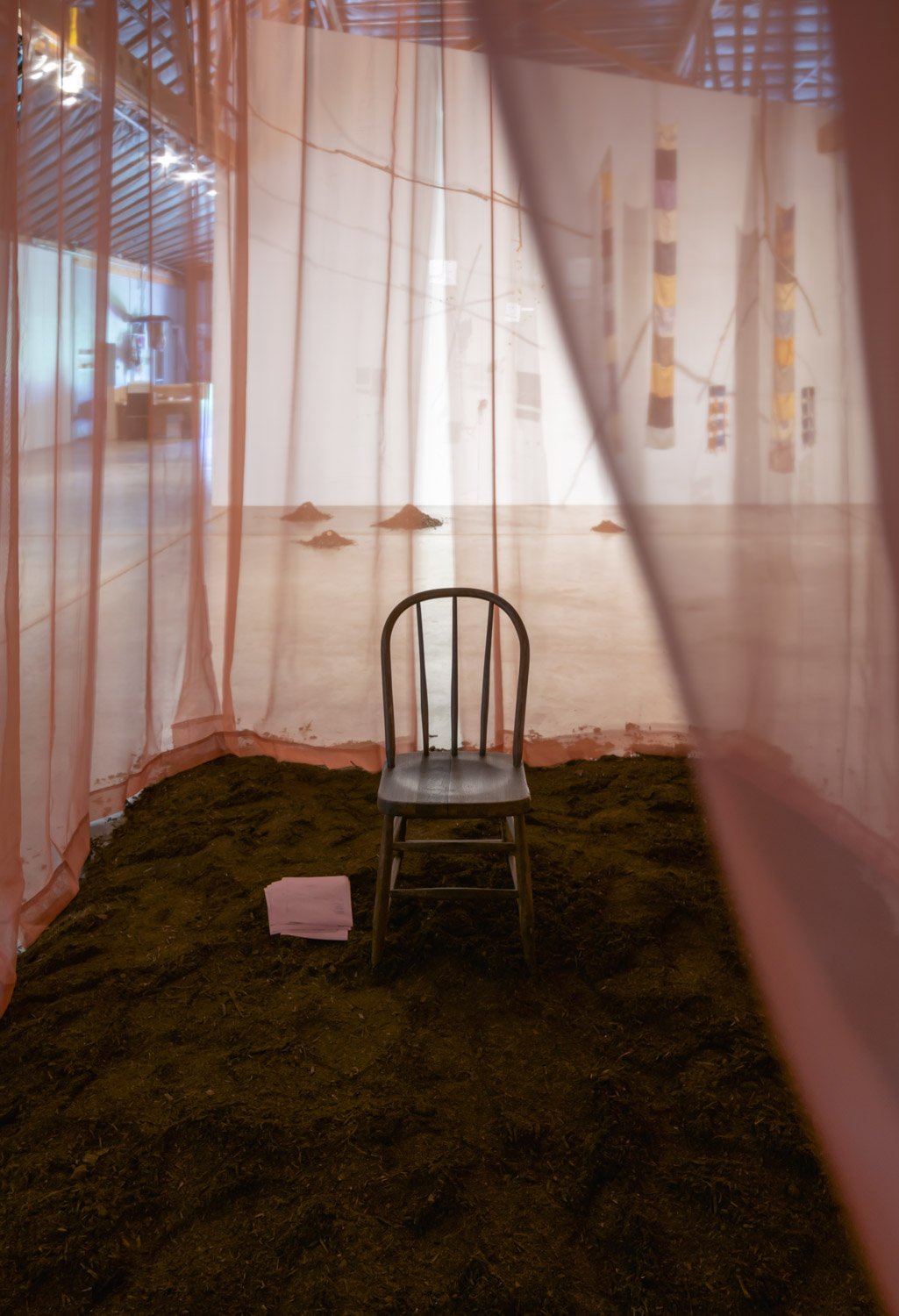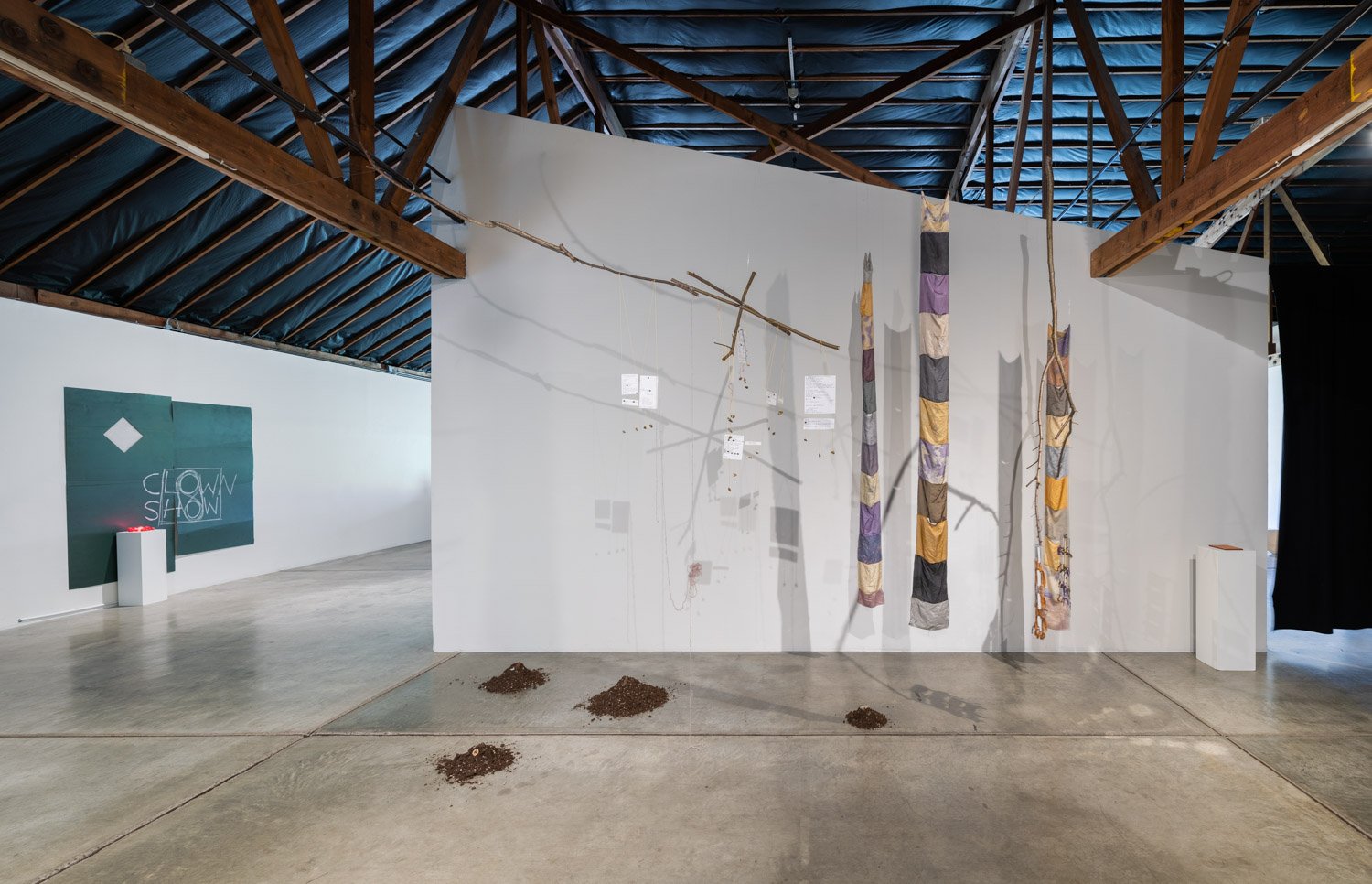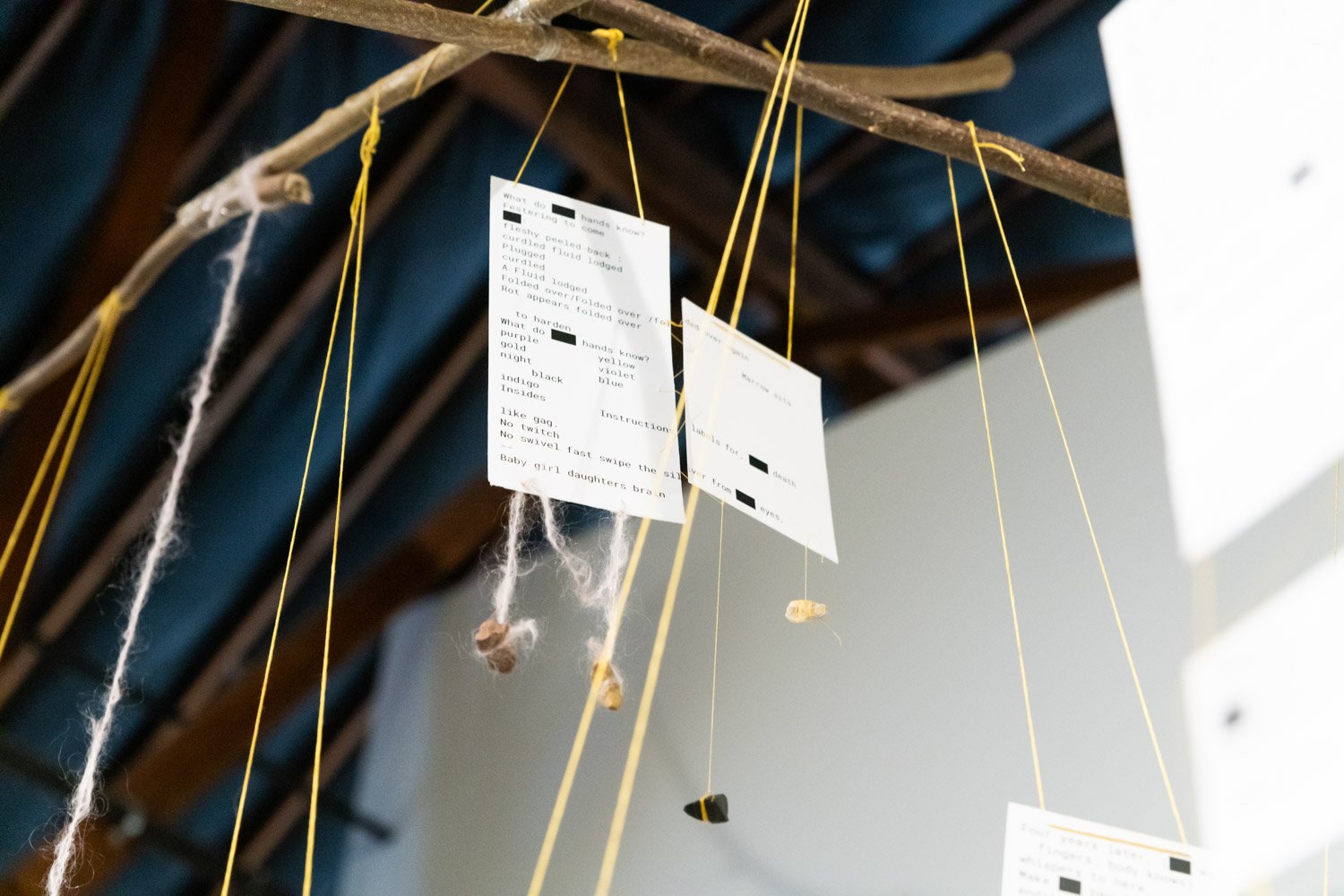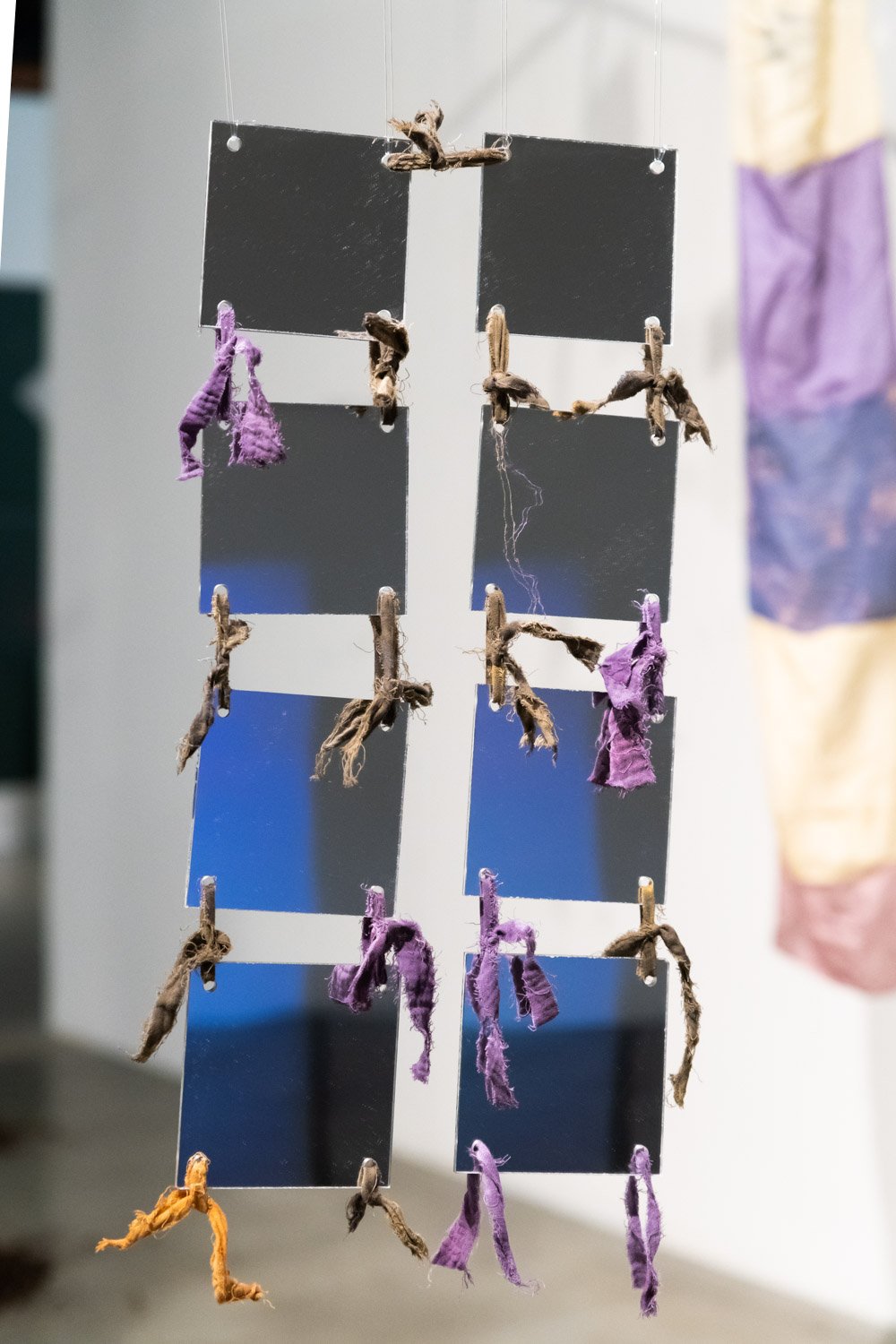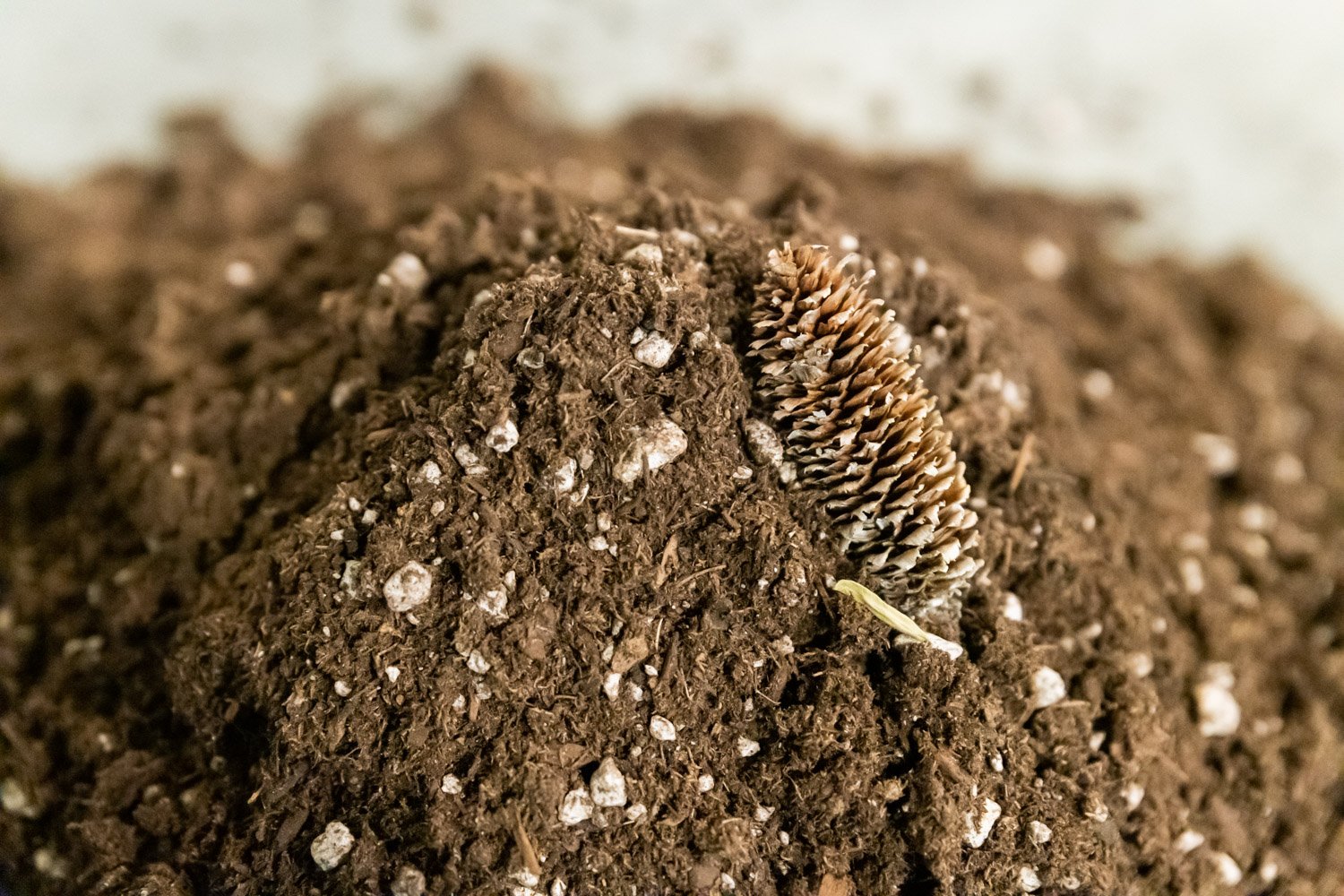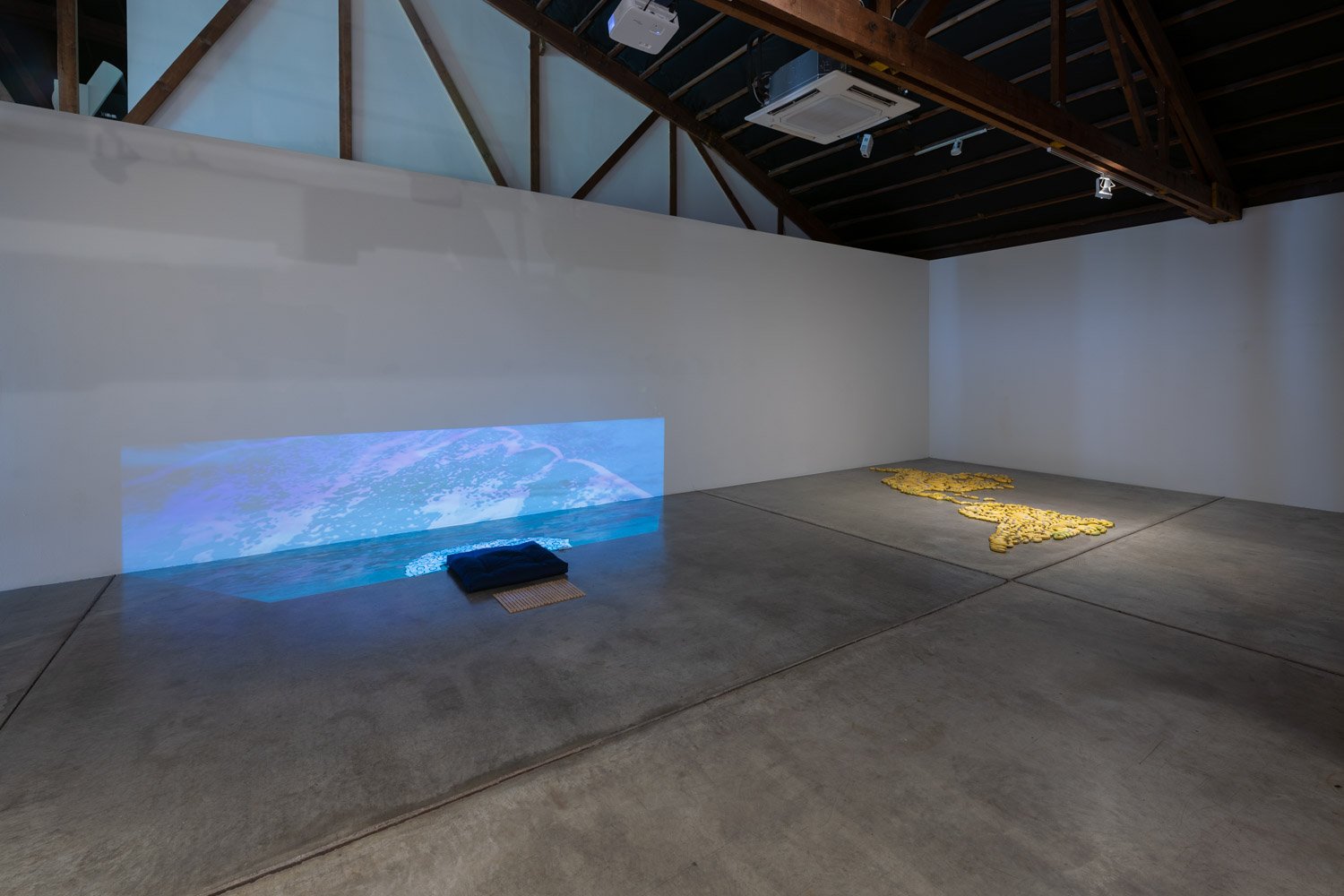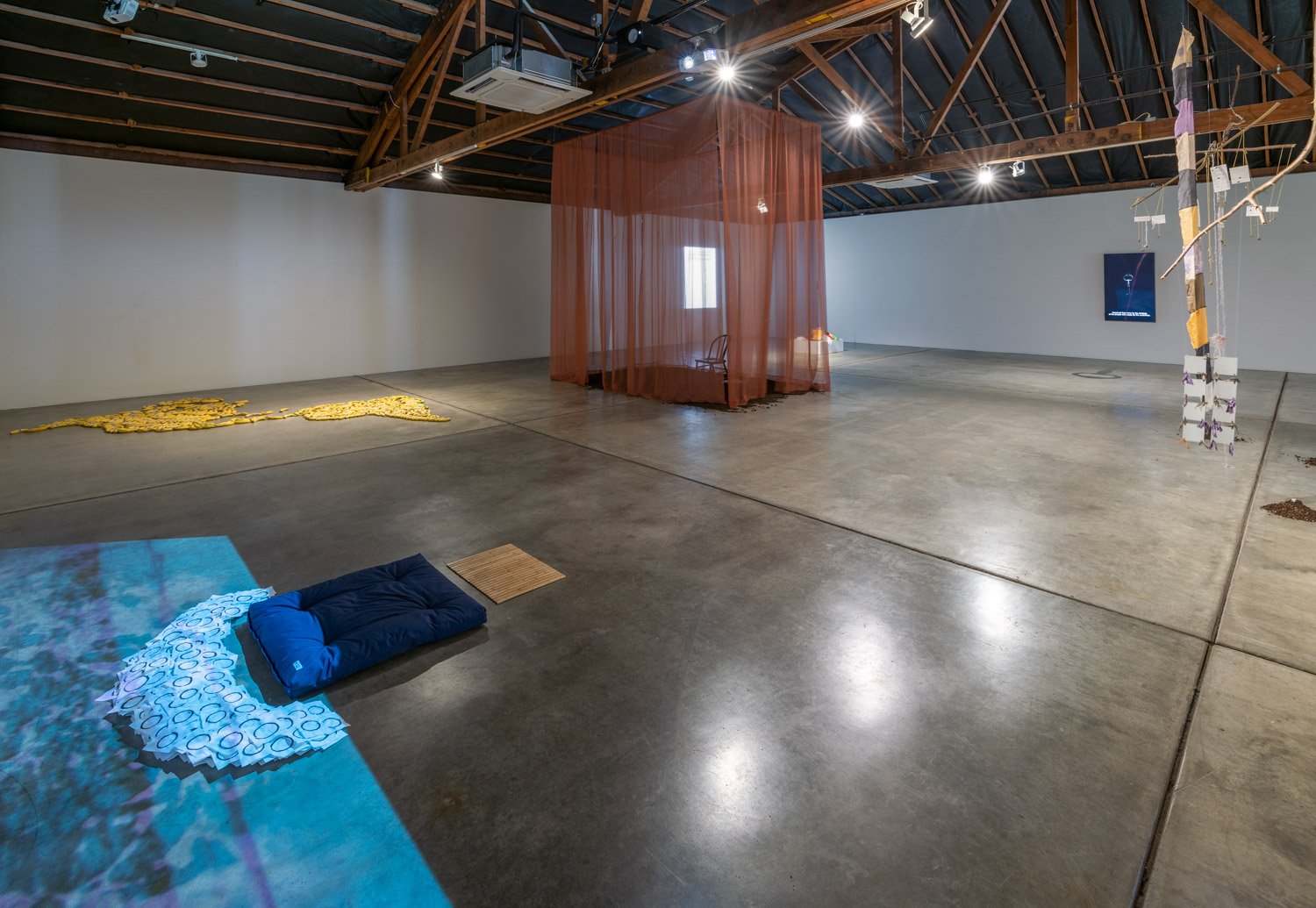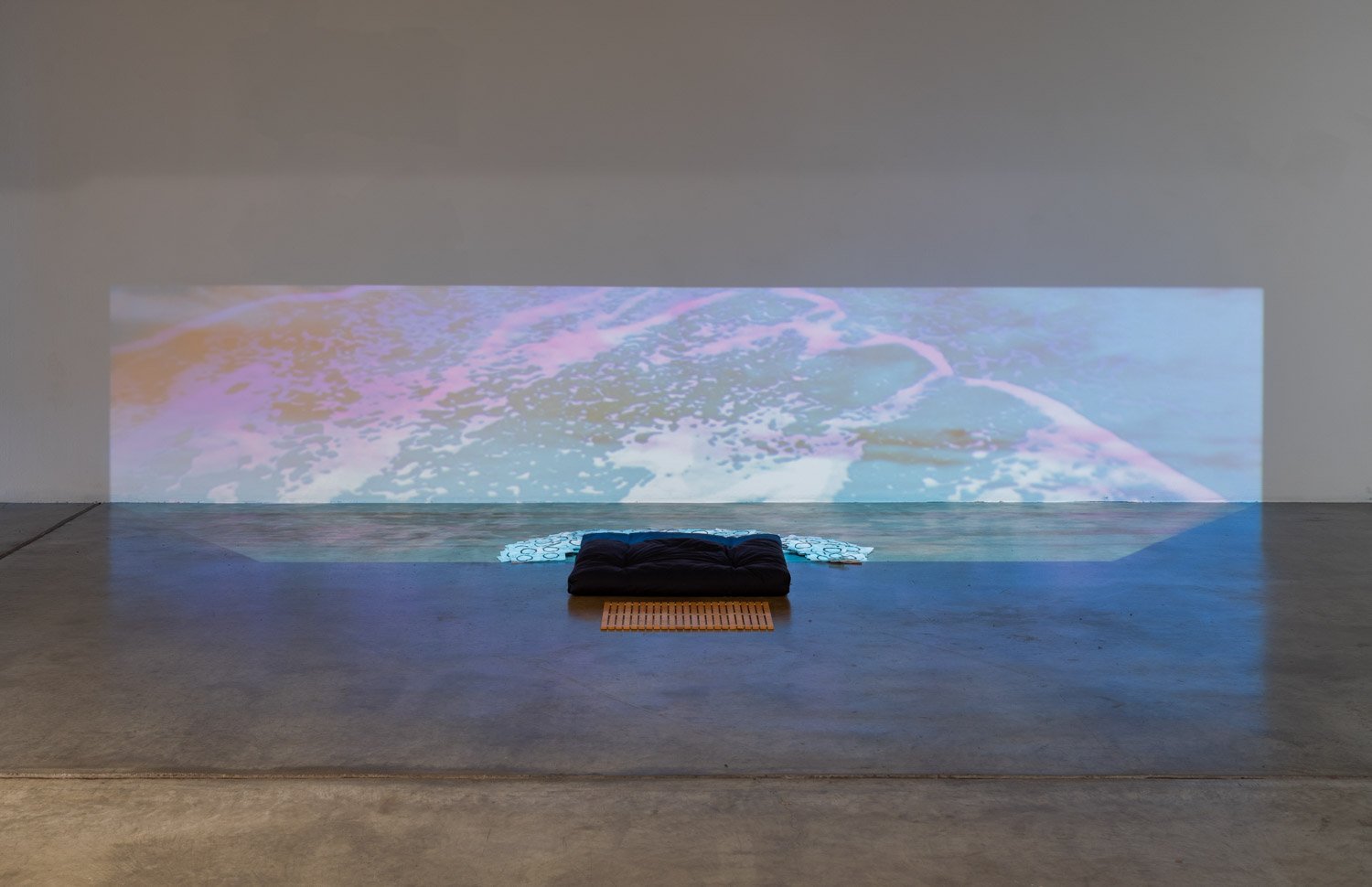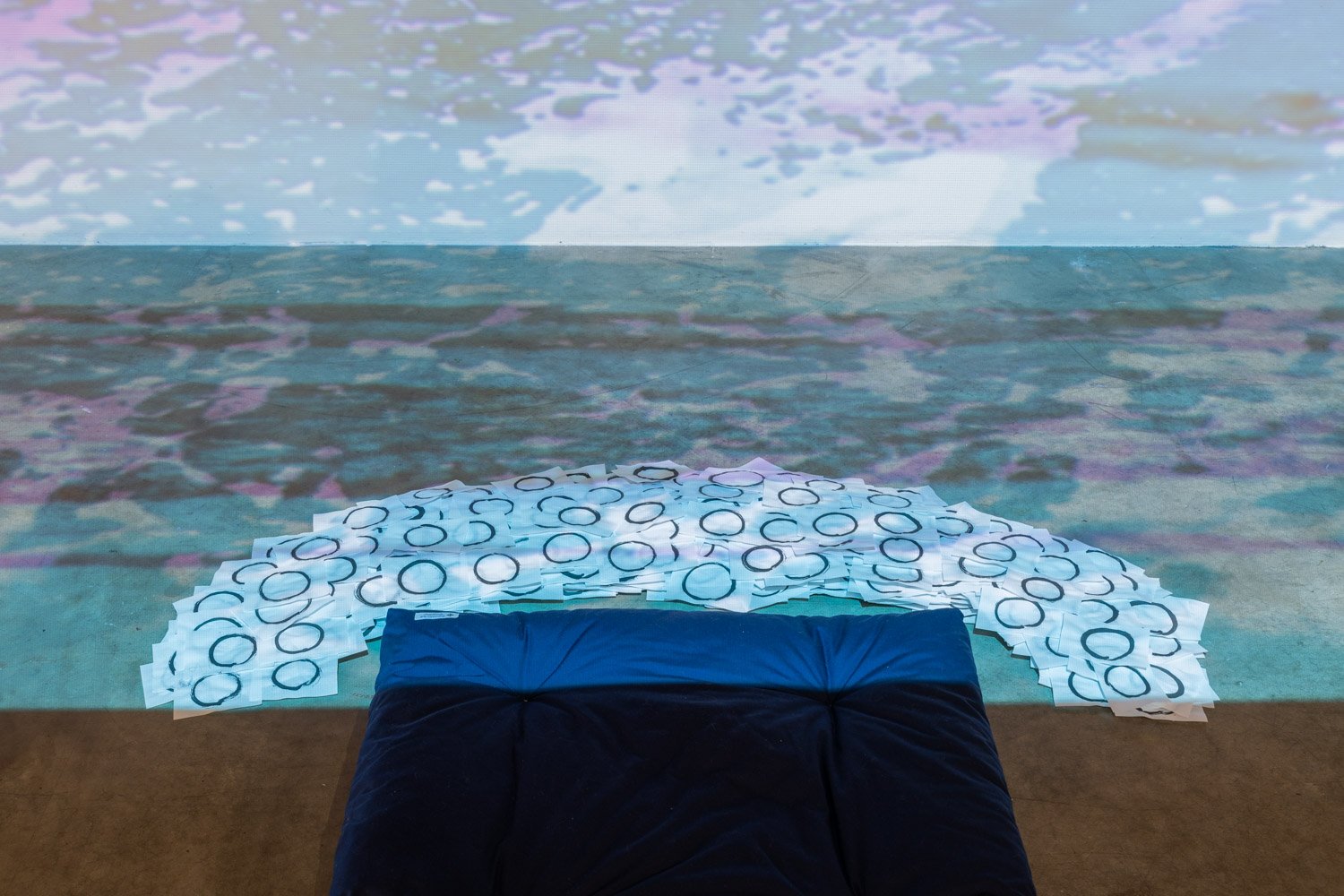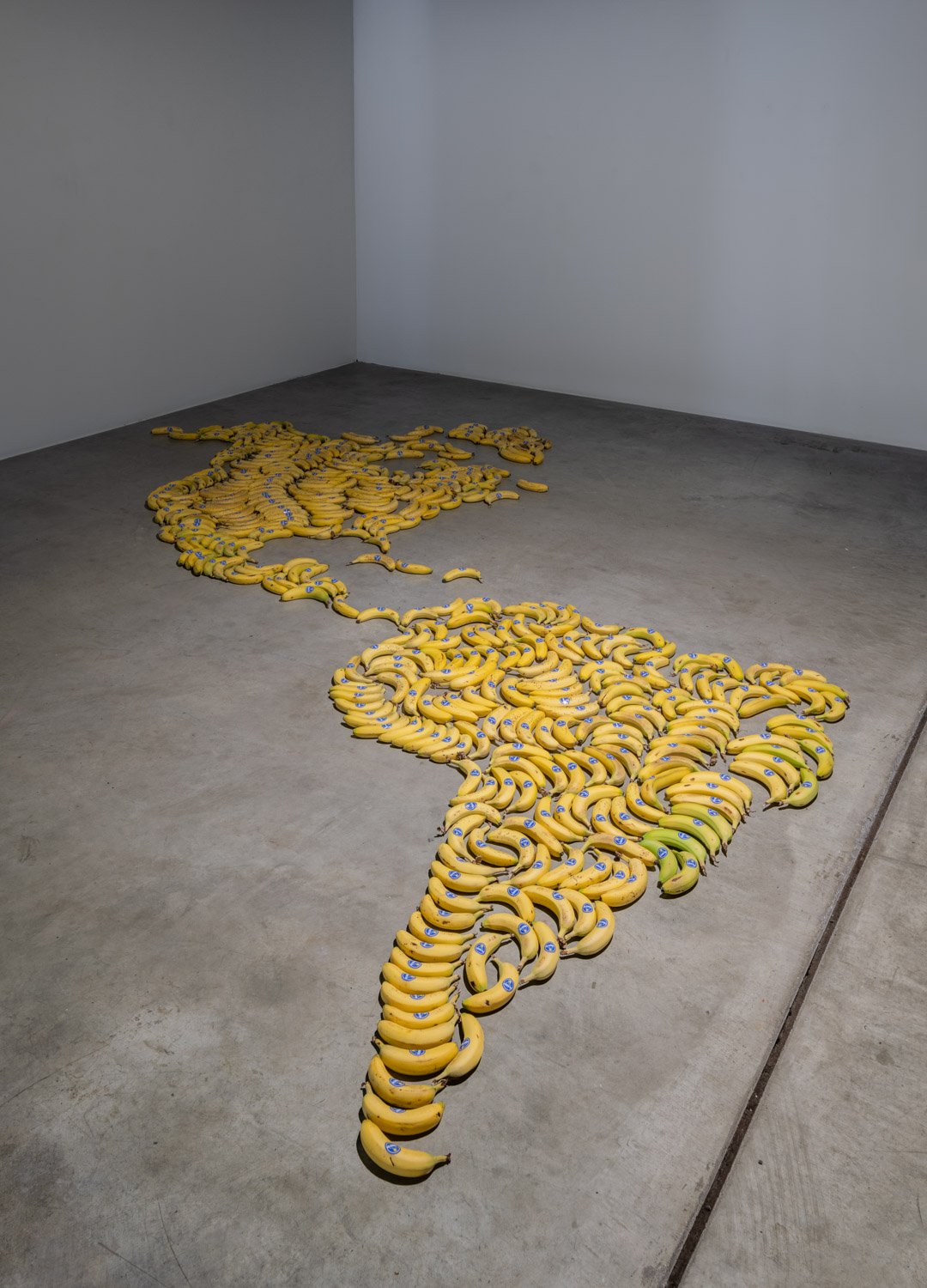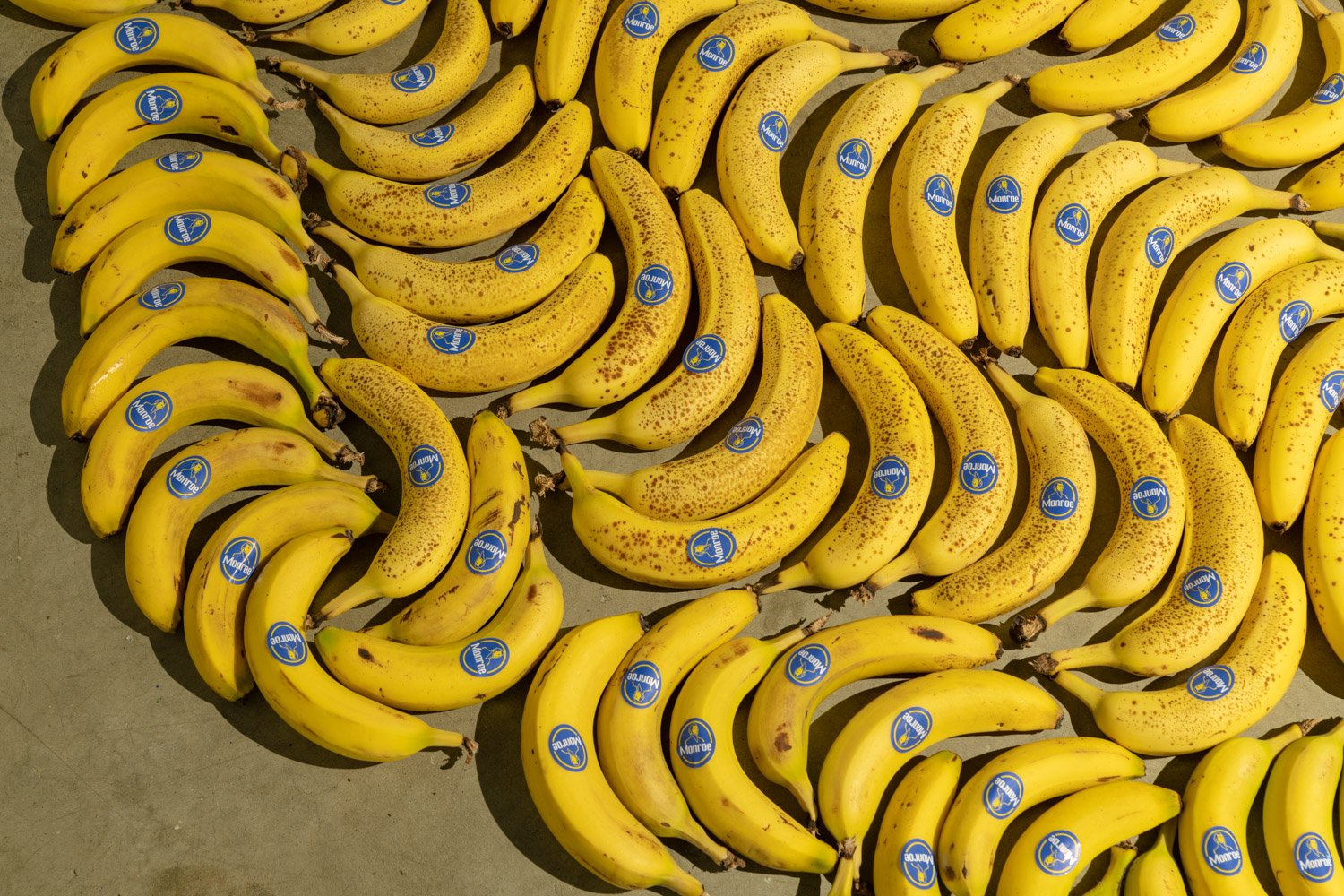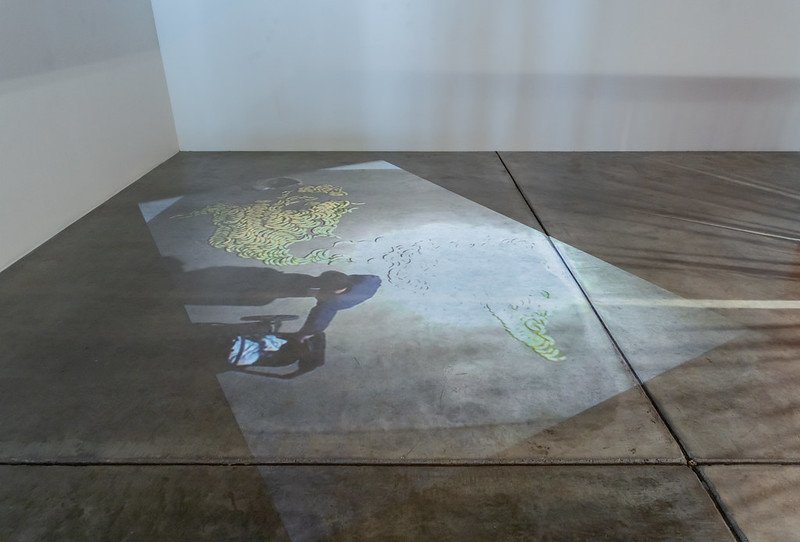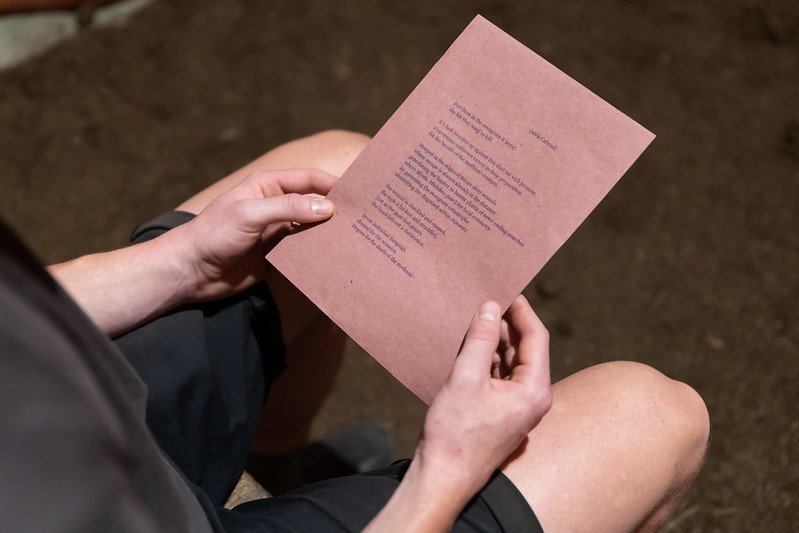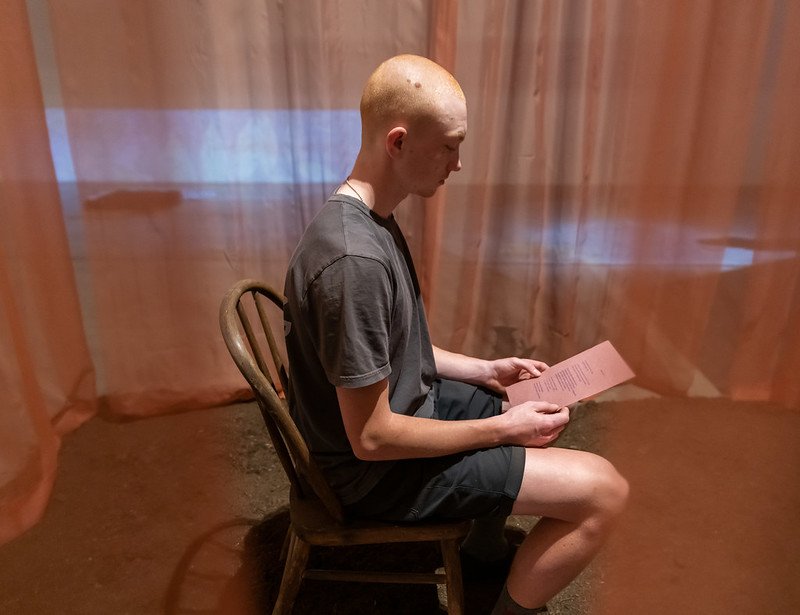Omens of Capacity
21 April 2023 – 11 June 2023
Photographs by Mario Gallucci
Video by Eric Mellencamp
Poetry reading on May 21, 2023, 5—7pm with Janice Lee, manuel arturo abreu, J.A. Wilhite-hannisdal, and Bridgette Hickey. Remote activation of Shanzhai Lyric work.
Reception on June 3, 2023, 5—8pm
home school and Oregon Contemporary present Omens of Capacity, featuring work by Jackie Abhulimen, Bridgette Hickey, Janice Lee, Ariana Nuala, Diego Morales-Portillo, Alex Tatarsky, and Shanzhai Lyric. With a title drawing from Guyanese writer Wilson Harris, the final show in the eleventh season of the Curator in Residence program "reads back through the shock of place and time for omens of capacity that were latent, unrealized, within the clash of cultures and movements of peoples.”
Jackie Abhulimen presents a contemplative space modeled after the Hellenic cultic inner sanctum, ἄδῠτον (adyton) which initiates her publication platform of the same name. Unlike the Hellenic temple, however, this space is open to public entry.
Janice Lee presents a contemplative space comprising projection of a moving image work and a meditation cushion surrounded by drawings on rice paper by the artist; in her words, the work “is a reminder of Thich Nhat Hanh’s concept of interbeing, that the environment is not outside you; you are the environment. The title for this work derives from a particular confluence of Korean words: 바다 (bada) meaning sea or ocean; 받다 (badda) meaning to receive, undergo, endure (suffering), or support; 바닥 (badak) meaning ground or floor.”
Bridgette Hickey draws upon ancestral somatic healing practices in a floating sculpture that incorporates branches, a poem on dyed paper, and mirrored acrylic. The work is part of an ongoing prayer for life on this plane, and a process-based mapping of the body’s relation to time, landscape, and sense of life. What happens when much of what we carry, or what carries us, is on another plane? Map-making to this plane of life necessitates, in the artist’s words, “alternative modes of communication, bridges, honoring.”
Performer Alex Tatarsky presents a rot altar that explores etymological overlaps between “clown” and “clod.” To feel low, to feel like Pagliacci, to feel in the dirt: what kind of connections unfold when one sits with these etymological slippages? Comprising traces of a remote performance, the work operates in a dimension of play against a replica of NYC construction barriers (“post no bills") which serve as surfaces for accumulating notes and marks.
Recife-based curator and scholar Ariana Nuala presents a new video about the quilombo leader Malunguinho, who led Afroindigenous and Amerindigenous people in resistance against Portuguese colonizers. The work connects this living legacy to contemporary Afroindigenous and Amerindigenous makers, thinkers, and cultural workers. Referencing Chiquita Banana, the Monroe Doctrine, and the debt-governed banana republic through which the United States exerts influence in its “backyard,” Diego Morales-Portillo presents an interactive work consisting of bananas with artist-designed stickers laid on the ground in the shape of the Latin American continent. Viewers are invited to take one or more, take the peel and sticker home or leave them, and reflect on the colonial conditions that lead to a Guatemalan banana becoming available for a Portland shopper.
In Endless Garment (2015-), Shanzhai Lyric explore the potential of mis-translation and nonsense as utopian world-making. Their archive of shanzhai poetry-garments is available here to be read aloud by audiences; a mic picks up speech and converts it to text projected behind the archive, expanding a neverending poem catalyzed by the fecundity of the error.
*
The strange and secret rooms of your voice. It waters its own flowers, but the flowers are tiny old men that feast on heaps of cig butts and hang things on string for fun.
I was not the first to reach this memory. Who put it there? Yes, against this light from a purple-edged leaf lodged in the mind we see again your mother holding you by a string, but looking closer we see the string is a song.
This place of stripped rocks where we burn trash, here each angel moves forward to relinquish its name. Worlds are snuffed out. We never had access to them to begin with, but it still hurts to witness. Even those who don’t believe in gods may still fear their secret names, encoded like lineages into those of the angels. Only the mothers learn these.
Those who jumped overboard may have had to transform in order to reach rest. The bones at the bottom of the ocean need to rest. They don’t need to be a railroad. There is no final witness if the past is not yet past.
When you ingest the enemy to become stronger and make a flute from the bone, you can play a blood melody that builds two versions of a stone castle. On closer inspection you see it’s not stone, but ossified coral. I was not the one who asked you to come forward, you hear someone say.
– manuel arturo abreu
Programming for Curator in Residence Season 11 is generously supported by Stephanie Snyder and the Douglas F. Cooley Memorial Art Gallery at Reed College, and the Office for Contemporary Art Norway. Oregon Contemporary is supported by the James F. & Marion L. Miller Foundation; the Regional Arts & Culture Council, including support from the City of Portland, Multnomah County, and the Arts Education & Access Fund; the Maybelle Clark Macdonald Fund; and the Oregon Community Foundation. Oregon Contemporary also receives support from the Oregon Arts Commission, a state agency funded by the State of Oregon and the National Endowment for the Arts. Other businesses and individuals provide additional support.
Jackie Abhulimen is a writer, scholar and activist from Athens, Greece. Her activism in dismantling the inequities that shape the migrant experience in Europe has been featured in the New York Times, Aljazeera, NPR to name a few, and in local Greek press. Jackie holds a BA in Development and Peace Studies from the University of Bradford and an MA in Performance Studies from New York University. She currently lives in New York City, writes on black diasporic culture and practice and is working on her first manuscript of poems.
Bridgette Hickey is a heart and shadow scientist, a multidisciplinary archivist exploring interspecies communication with her ancestors. She works in repetitive time intensive traditional mediums to weave fragmented and disembodied themes and materials.
They are a community herbalist, poet, and care worker currently developing their skills in textiles, education, grief facilitation, and craniosacral therapy. She has been led here through a remembering of her families Black Gullah, white Irish, Nipmuc, and Mohawk lifeways.
Bridgette has a background in medical anthropology with a focus on state inflicted intimate violence and chronic illness. She has an appreciation for relational neuroscience and somatics: the ways our sinew hold stories of joy, pain, love, and guidance for the beyond.
Bridgette’s work Doing My Hair was included in an artist talk alongside Lisa Jarrett, Sharita Towne, and Susana Pilar Delahanate Matienzo in 2015. In 2020 Bridgette collaborated with Salimatu Amabebe’s love letters to black folks creating flower and environmental literary essences. They are featured on Water in The Desert website as one of the 2020 Switch artists in residency alongside Intisar Abioto, Sidony O’neal, Yawa Amenta, and Ni Abioto. Bridgette is a spring 2022 recipient of a make build learn RACC grant to support her current herbal textile work Beloved Fragments in collaboration with Adriene Cruz and is a current summer 2022 PLAYA resident.
Janice Lee (she/they) is a Korean American writer, teacher, spiritual scholar, and shamanic healer. She is the author of 7 books of fiction, creative nonfiction & poetry, most recently Imagine a Death (Texas Review Press, 2021) and Separation Anxiety (CLASH Books, 2022), a finalist for the 2023 Oregon Book Award. A roundtable, unanimous dreamers chime in, a collaborative novel co-authored with Brenda Iijima, is forthcoming in April 2023 from Meekling Press. An essay (co-authored with Jared Woodland) is featured in the recently released 4K restoration of Sátántangó (dir. Béla Tarr) from Arbelos Films. As a writer she is interested in the decolonization of narrative and language, and the systems which we use to make meaning and create reality. Incorporating shamanic and energetic healing, Lee teaches workshops on inherited trauma, healing, and writing. She is trained in the Q’ero tradition of medicine and energy work and is a practitioner of Zen Buddhism in the tradition of Plum Village and Thich Nhat Hanh. She also incorporates elements of Korean shamanic ritual (Muism), Korean folk magic, plant medicine and stone/flower essence work, and interspecies communication. She currently lives in Portland, OR where she is the Operational Creative Director at Corporeal Writing and an Assistant Professor of Creative Writing at Portland State University.
Ariana Nuala (b. 1993, Recife, Brazil) - Ariana Nuala is an educator, researcher and curator. She often works collectively to explore issues related to power, permanence and the visible and invisible plots that make possible the existence of community diasporic practices by combining strategies that begin in the body. She is currently a master's student at the Federal University of Paraíba in the field of Art History .She worked in the Coordination of Education at the Murillo La Greca Museum (2018 – 2020) and is currently assistant curator at the Oficina Francisco Brennand Institute. Nuala coordinates the Platform and Residency Práticas Desviantes, and is also a member and curator of the collectives CARNI (@carnicoletivo) and Trovoa (@trovoa__).
Diego Morales-Portillo (* 1992, Ciudad de Guatemala) is a multidisciplinary artist and graphic designer living and working in Portland, OR. Morales-Portillo graduated as a bachelor in artistic drawing at the National School of Fine Arts of Guatemala in 2010, in 2015 he received a Bachelor's degree in Graphic Design and Advertising with a Cum Laude degree from the Universidad del Istmo, in 2019 he received the degree of Master's MFA in Visual Studies at Pacific Northwest College of Art in Portland, OR. Diego has presented his work in Argentina, El Salvador, Guatemala, Italy, North Korea, Spain and the United States in exhibitions such as the 18th Asian Art Biennial of Bangladesh, 2017 Pacific Standard Time LA/LA; Mapping Narratives: New Prints 2021/Winter at the International Print Center in NY (2021); auction and exhibition of Latin American art Juannio 2013, 2016, 2017, 2020. His work is in public collections such as Neo-Murales of the Rozas Botran Foundation and Imago Mundi of Luciano Benneton in Italy and Portable Works collection of the Regional Arts & Culture Council (RACC) in Portland, Oregon. Diego has been awarded residencies such as Open Studio Residency at Haystack Mountain, The Studios at MASS MoCA, Caldera Art residency in Sisters and Leland Iron Works at Oregon City, both in Oregon.
Called “a hilarious, finely tuned absurdist” (Theatre Jones), Alex Tatarsky makes performances in the uncomfortable in-between zone of comedy, dance-theater, performance art, and deluded rant – sometimes with songs. Tatarsky experienced fleeting fame as Andy Kaufman’s daughter and used to perform as a mound of dirt. Playing with perceptions of language and narrative structure, their live performances are highly responsive to venue and audience, often breaking the fourth wall and embracing humor to reveal vulnerability and humanity. Venues include Abrons Arts Center, La Mama, MoMA PS1, The Kitchen, Judson Church and many bars and basements. As curatorial fellow at the Poetry Project, they organized a series on the poetics of rot. Research interests include bootlegs, hellscapes, and compost. @tartar.biz
Shanzhai Lyric is a body of research focusing on radical logistics and linguistics through the prism of technological aberration and nonofficial cultures. The project takes inspiration from the experimental English of shanzhai t-shirts made in China and proliferating across the globe to examine how the language of counterfeit uses mimicry, hybridity, and permutation to both revel in and reveal the artifice of global hierarchies. Through an ever-growing archive of poetry-garments, Shanzhai Lyric explores the potential of mis-translation and nonsense as utopian world-making (breaking) and has previously taken the form of poetry-lecture, essay, and installation. In the fall of 2020, Shanzhai Lyric founded the fictional office entity Canal Street Research Association.
home school is a free pop-up art school and space of sacred duty co-run by Victoria Anne Reis and manuel arturo abreu. Since 2015, home school has offered genre-nonconforming edutainment, critical care, and contexts for contemplation, all free or sliding scale for local and remote publics.

